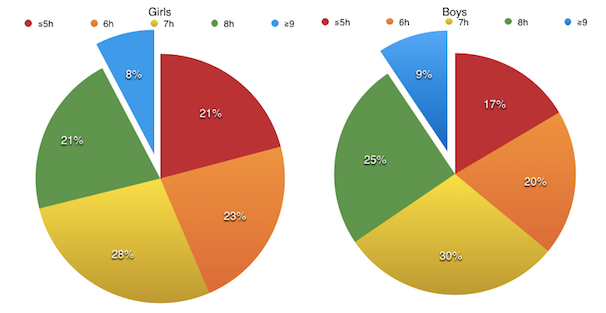Time to Shine – Changing start times to allow more sleep would lead to better student performance


A recent study was published by the Centers for Disease Control on the amount of time that teenagers sleep on an average school night between the years of 2007-2013.
According to the American Academy of Sleep Medicine, “High school and junior high students should start no later than 8:30 in the morning.”
When schools start earlier than 8:30 for convenience, they go against science. As students get older, higher level classes add stress to their day, so why do high schools start earlier than elementary schools? Over 70 percent of high schoolers admitted to sleeping less than seven hours on average each night as compared to the recommendation of eight-10 hours.
It can become very difficult for students to balance school, sleep, extracurriculars and work all at the same time, and still get the recommended hours of sleep. Many side effects come with this sleep deprivation as well: poor school performance, susceptibility to athletic injury, cardiovascular problems, and a higher risk for depressive symptoms are just a few. Starting school later in the morning would benefit high school students by reducing stress and regulating natural adolescent sleep cycles.
Starting school 45 minutes later would decrease stress levels all across the board, especially for high school students. An article, “Schools Awakening to Teens’ Sleep Needs” by Kay Manning said, “Until people see start times having an effect on stress as a public health issue, communities won’t change, even if schools want to.”
This proves people recognize school starts abnormally early. To expect performance levels to be high with the contributing factors including added stress and sleep deprivation is not favorable. Kay’s quote states that communities need to change not just the later start times, but more importantly, their views on the issue so that people can recognize the real reason why the later start times are put in place.
Stress builds up with the higher level classes students begin to take as they advance in their high school career. Late nights can often become routine for students to be able to get homework and studying crammed together due to the amount of homework assigned to them on top of extra curriculars.
During especially stressful times like finals week, many students struggle with balancing work, school, family, relationships and self care. Changing a simple thing such as delaying the start time for school is an easily achievable way to make everyone’s lives easier, including educators. Starting later in the morning would give all the opportunity to be better rested and prepared for the day of teaching or learning.
Starting school later needs to be a mindset change and not just a routine change. It’s important for U.S. states to realize that a change first has to start with communities truly understanding the stress and why it occurs, in order to spread refined knowledge as well as inform people of the benefits resulting from it. Starting school later would not only decrease stress levels, but be an overall benefit for students and educators as well.
Starting school later in the morning would also significantly improve the regulation of adolescent sleep cycles.
According to an article, “The Impact of School Starting Time On Family Life”, author Gordon D. Wrobel writes, “There is a growing concern that children, and especially adolescents, are not getting the sleep they require to be at their best in school, at work, or in the community.”
The concern of sleep regulation is becoming a much greater issue as more and more people are finding out about the effects of sleep deprivation. For example, starting school later would benefit not only the students, but parents, teachers, faculty and others.
Morning classes are always the most difficult, as student brains are still beginning the stimulation process for the day. Delaying what time schools start in the morning would give students the chance to be more awake when they come to their first class.
The science is there to back it up, and many schools have already taken action in the right direction. The number of schools following the lead of starting later continues to grow, along with the number of students benefiting from the delay. Eliminating restlessness for high schoolers by starting school later in the morning would be beneficial to all.
Some opposed to changing school starting times say to “just get school over with” earlier in the day so as not to end later in the afternoon in order to make room for extra curriculars and other social activities.
Experts have been strongly suggesting school start times to change for over 10 years now. “The average amount of sleep that teenagers get is between 7 and 7¼ hours. However, studies show that most teenagers need exactly 9¼ hours of sleep,” according to the article, “Sleep in Adolescents” by Nationwide Children’s.
When better rested, performance levels for just about everything rise. By allowing more rest time for students, a significantly higher positivity level could be acquired as well. With a positive energy from students, they’ll have more motivation to put their best effort into their work along with feeling more awake and prepared for the day. As a result, it skews their stress levels skyhigh at times. However unnecessarily early high schools do start, the time does indeed affect the natural sleep patterns a teenager should have.









You must be logged in to post a comment Login